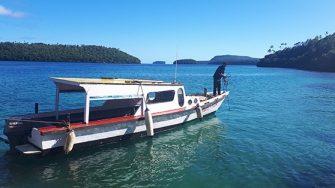
COVID-19 and other emergencies have highlighted the interdependence of health security and health systems; with an opportunity to build back better. Two new reports provide a roadmap for stronger post-pandemic health systems in the Indo-Pacific.
Two evidence-based reports launched today, led by UNSW Sydney and the University of Sydney, outline how we can build resilient health systems and reduce the risk of acute public health events like outbreaks in the Indo-Pacific.
The reports present data on opportunities for Australia to demonstrate leadership in global health and development in the Indo-Pacific, noting the strong cultural, economic and trade ties to neighbouring countries, as well as the benefits to Australia of strengthening neighbouring health systems.
The reports also suggest that investments in the health workforce and health information systems would improve the population’s health.
The UNSW Sydney report, “Investing in our future: Building strong and resilient health systems in the Indo-Pacific region” provides recommendations for prioritising health system investment based on findings from seven countries: Cambodia, Fiji, Indonesia, Lao PDR, Papua New Guinea, Solomon Islands, and Vietnam. The recommendations span the areas of governance, financing, physical and human resources, health service delivery, and health information systems.
Lead author, Dr Christine Linhart from the School of Population Health, UNSW Sydney, said it is imperative that we focus on building strong and resilient health systems in the Indo-Pacific region, capable of responding to health emergencies such as COVID-19, while maintaining continuous access to essential health services and addressing ongoing population health needs.
“We found that efforts to strengthen health systems across the region need to focus on increasing equity in access, quality of care and resource optimisation, and that without locally relevant initiatives that fit the context, such efforts are likely to fail,” Dr Linhart said.
“COVID-19 has had severe and likely long-term ramifications on health systems and population health outcomes in the Indo-Pacific, and progress to-date to improve equitable access to quality health services may stagnate or even reverse,” said Dr Linhart.
“The complexity of local health system challenges is further exacerbated by the high risk of extreme natural events and disasters and vulnerability to the effects of climate change and rising sea levels in many of these countries,” she said. “We hope our recommendations can provide a starting point to identify local solutions to improve health for all.”
International development organisation The Fred Hollows Foundation commissioned the report and Deputy CEO Nick Martin said investing in primary care services must be prioritised.
“We recognise that our call for greater investment in health and development must be based on evidence. This report shows the inextricable nature of Australia’s relationship with the Indo-Pacific, and that without resilient health systems in the region, our security and prosperity is at stake,” he said.
The University of Sydney report, “Health security in the Pacific: Expert perspectives to guide health system strengthening”, brought together 24 experts from Australia and the Pacific region, who have expertise in health security, health systems and have lived experience of working in the Pacific. Data from focus group discussions informed the findings on major needs and gaps in preparedness which should be improved upon, taking into account the lessons learnt from COVID-19.
Lead author, Associate Professor Meru Sheel from The University of Sydney Institute for Infectious Diseases and School of Public Health, Faculty of Medicine and Health, said it was imperative to ramp up investments in the health systems of our neighbours.
“We need to be better prepared to reduce the impact of future outbreaks, not just rely on border control as a quick fix. For example, improving surveillance of diseases in the region is a huge task and one we should be jointly planning now,” said Associate Professor Sheel.
Marc Purcell, CEO of the Australian Council for International Development (ACFID), which commissioned the University of Sydney report, said a key take-out was the importance of supporting self-determination for our neighbours regarding their health security.
Mr Purcell said: "The findings of this report reinforce that our role is to support them as best we can in strengthening their health systems to ensure their own needs are met."
Combined recommendations from the two reports include:
- Improve the quantity and quality of the health workforce, particularly at the primary health care level; and strengthen community health worker programs.
- Increase long-term investment in health information system infrastructure and workforce; and strengthen data quality and data culture.
- Invest in country-led approaches, rather than the one-size-fits-all approach that is often applied.
- Strengthen the capacity at all levels of government for health planning, budgeting and management, particularly in countries with a decentralised government
- Prioritise catch-up vaccination programs to minimise outbreaks of vaccine-preventable diseases.
- Expand and integrate lab surveillance from diseases currently monitored to other diseases such as tuberculosis, malaria and emerging infectious diseases.
The two reports focused variously on the Indo-Pacific region (specifically Cambodia, Fiji, Indonesia, Lao PDR, Papua New Guinea, Solomon Islands, Vietnam) and the Pacific (Timor Leste, Papua New Guinea and Pacific Island countries and areas: Cook Islands, Fiji, Kiribati, the Republic of the Marshall Islands, the Federated States of Micronesia, Nauru, Niue, Palau, Samoa, Solomon Islands, the Kingdom of Tonga, Tuvalu and Vanuatu).
Other authors from the UNSW School of Population Health are Dr Adam Craig, Dr Alex Roswell, Dr Kristen Beek and Dr Jerico Pardosi.
Photo by Christine Linhart: A man on a boat that transports people between the outer islands and the health centre in the northern Tongan island chain of Vava'u
Contact Name :
UNSW School of Population Health
